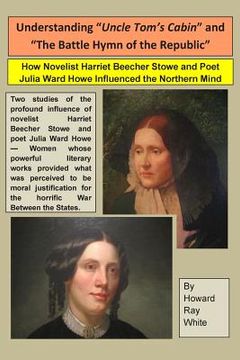Understanding "Uncle Tom's Cabin" and "The Battle Hymn of the Republic": How Novelist Harriet Beecher Stowe and Poet Julia Ward Howe Influenced the No (in English)
Synopsis "Understanding "Uncle Tom's Cabin" and "The Battle Hymn of the Republic": How Novelist Harriet Beecher Stowe and Poet Julia Ward Howe Influenced the No (in English)"
The most influential literary contribution to the politics of the northern States during the mid-to-late 1850's - helping incite State Secession and a horrific four-year war that killed 360,000 Federals - was Harriet Beecher Stowe's novel, "Uncle Tom's Cabin," published in 1851-52, just before the onset of "Bleeding Kansas." Likewise, that war's most influential music/poetry contribution - morally justifying, in the minds of many northern States people, the military conquest of the Confederacy and the huge death toll suffered - was Julia Ward Howe's poem "The Battle Hymn of the Republic" (1861), a variation upon the then-recent Federal army camp folk song, "John Brown's Body," which was an intentional mockery of a very popular, traditional South Carolina church revival song, "Say, Brothers," its music and lyrics written by William Steffe a few years earlier. The "Battle Hymn" is handed down to us today as "lyrics by Julia Ward Howe and music by William Steffe." The two essays in this booklet are excerpted from Howard Ray White's four volume history, titled, "Bloodstains, an Epic History of the Politics that Produced and Sustained the American Civil War and the Political Reconstruction that Followed." This booklet and other works by the writer are available as e-books and as paper books on Amazon.com. Search "Howard Ray White". In the mid-1800's women were not to be leaders in politics and religion, but Harriet Beecher Stowe and Julia Ward Howe did just that. Of Harriet, daughter of Lyman Beecher and sister of Henry Ward Beecher, both influential Abolitionists/ministers/educators, Sinclair Lewis would write: "Uncle Tom's Cabin was the first evidence to America that no hurricane can be so disastrous to a country as a ruthlessly humanitarian woman." The same could be equally said of Julia, a close friend of Charles Sumner and, wife of Boston Abolitionist leader Samuel Howe, one of the "Secret Six" financial supporters of the notorious John Brown.

